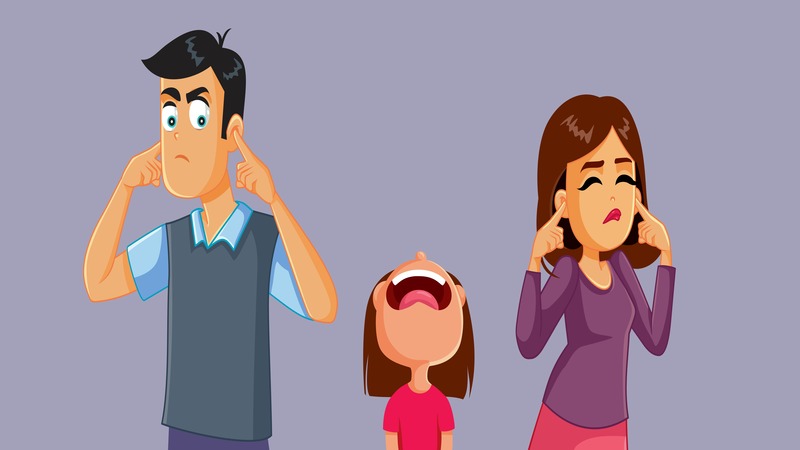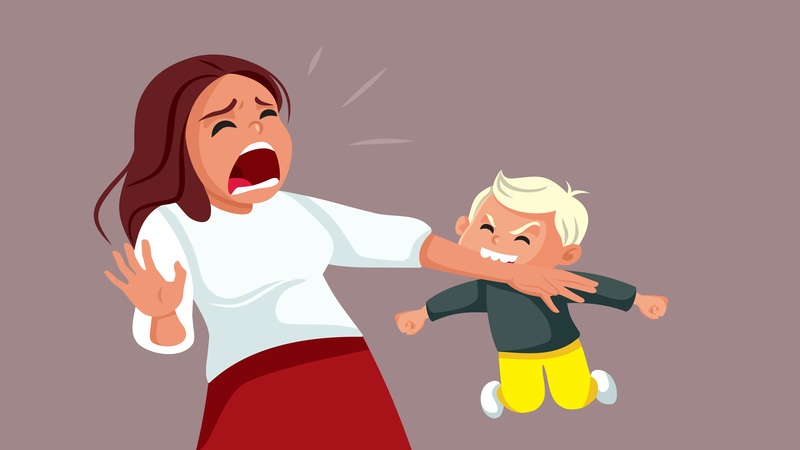 We are all familiar with toddlers screaming till their voice turns hoarse or their face turns red. We have seen helpless parents trying everything from threats to bribes to just get their toddlers to stop the screaming. Screaming toddlers can be a very tricky situation to handle.
We are all familiar with toddlers screaming till their voice turns hoarse or their face turns red. We have seen helpless parents trying everything from threats to bribes to just get their toddlers to stop the screaming. Screaming toddlers can be a very tricky situation to handle.
When a toddler starts screaming for no apparent reason or screams for everything, what is a parent to do? Do they ignore it, give in to the demand, or threaten the toddler to stop? Each of these approaches has its own advantages and disadvantages. So, what can you do with your screaming toddler? Read on to find out.
Why Do Toddlers Scream?

Toddlers can scream for a different reason every time or the same reason most times. Here are some possible reasons for your toddler to scream:
- Inability to communicate their needs clearly, resulting in frustration and helplessness that come out as screams (1)
- Expressing strong emotions. Toddlers are still too young to articulate their feelings and express them using words
- The part of the brain responsible for impulse control is still developing, so they don’t understand when to scream or not. (2)
- They are learning how their behavior is affecting the people around them and what their limits or boundaries are.
- Just like adults, toddlers can scream when they are over-excited too. They just may not know when to stop.
Is Toddler Screaming Normal?

Yes, screaming is a natural part of a toddler’s emotional development. Their brains are still developing. Screaming is a way for them to understand the cause and effect of behaviors, test their boundaries, and express their feelings. Toddler screaming episodes typically last for about 15 minutes, after which the toddler will mostly move on to the next task. (3)
Toddler Screaming Tantrums

Ever thought there could be a term for such behavior? Yes, there is. Usually seen in children between the ages of 1 and 3, toddler tantrums are quite common. Toddler tantrums are marked by sudden changes in attitude and temperament.
If your child is happy in one minute and suddenly starts screaming his/her lungs out the other minute, your tiny tot is showing signs of toddler tantrums. It mostly occurs because children cannot speak much and communicate well at this age. Hence the shouting and yelling. (4)
How To Handle Your Screaming Toddler

It can be very difficult to stay calm and level-headed when your toddler is just screaming. Here are a few ways to handle your screaming toddler:
- Be empathetic and let them express their feelings
- Avoid giving their behavior too much attention
- Divert their attention (5)
- Set clear boundaries and be firm with your toddler.
- Take them to a place where you can handle them without all the stares and interference.
Tips To Prevent A Toddler From Screaming

It is not easy for a parent to handle a screaming toddler, especially when you have company or when outside. Here are a few tips to prevent the screaming before it starts:
- Identify Tantrum Triggers – Start noticing what triggers your toddler’s screaming. Is it when you say no, is it when you take away a toy or have to leave somewhere? Knowing the triggers can help you prepare mentally and handle your toddler better.
- Introduce The Concept of Inside And Outside Voice – Let them know they have to lower their voice indoors and can be a little louder when out in the open like the park or a play area. Talk to them in hushed voices indoors, every time they raise their voice. This will set a good example for them to follow.
- Check The Volume in Your House –Toddlers mimic their elders and if the elders are using loud voices, they will too.
- Use Positive Reinforcement – Refrain from screaming back or hitting them. Try positive reinforcement by recognizing and appreciating when your toddler finally stops screaming. (6)
- Turn it Into a Game – Play a game to see who can speak at their lowest voice and if the other can hear it. you can even play passing the secret game and start whispering into each other’s ears.
- Let Them Decide – If the tantrum or screaming starts because you chose their footwear or outfit, let them choose. Give them two or three choices and let them choose from them. This control over the final decision can help them cooperate better. (6a)
Should You Consult A Doctor?

If your toddler’s screaming episodes are very frequent or continue even after the age of 5 it can be concerning. If their screaming or tantrums cause hurt to themselves, you, or others around them, it is time to consult a doctor to understand if there is a problem that needs addressing. (6b)
Temper tantrums and screaming are quite common in toddlers. With patience, positive reinforcement, and strict boundaries, the screaming will eventually decrease and change into meaningful communication. (7)
FAQs
1. Is It Normal For Toddlers To Scream All The Time?
No. It is okay for them to scream occasionally but not always. If they are screaming at all times for no apparent reason, you should consult your doctor. (8)
2. Is It OK to Ignore a Screaming Toddler?
It depends on how you feel about ignoring your toddler as a parent. While some recommend actively ignoring a toddler’s tantrums to avoid giving it attention (9) and importance, some experts believe ignoring toddlers will teach them to not depend on you when they need something, thus affecting their attachment style. You can try acknowledging their tantrum but not encouraging it.
3. How Long Does the Screaming Phase Last in Toddlers?
Toddlers tend to reduce their tantrums and screaming as their communication improves. They will start using more words and expressions instead of just screaming out of helplessness.
Reference
- Laura L. Sisterhen; Paulette Ann W. Wy. University of Arkansas – https://www.ncbi.nlm.nih.gov/books/NBK544286/
- A version of this article appears in print on Oct. 25, 2020, Section D, Page 9 of the New York edition with the headline: Douse the Tantrums And Soothe Your Child, Brain still developing – https://www.nytimes.com/2020/10/15/parenting/kids-tantrums-advice.html
- Jennifer Katzenstein, Ph.D, Johns Hopkins School of Medicine Faculty, Toddler screaming is normal – https://www.hopkinsmedicine.org/health/wellness-and-prevention/babies-and-toddlers-discipline/when-to-worry-about-toddler-temper-tantrums
- Saranya Suresh, Sisira Satheesh, Yangchen, Benazeera, Shashikumar Jawadagi – ANNALS OF ABBASI SHAHEED HOSPITAL AND KARACHI MEDICAL & DENTAL COLLEGE 29(1):47-55 – https://www.researchgate.net/publication/378989011
- Reviewed by Laura Anderson Kirby, PhD, Expertise: Therapy for Children and Adolescents, Autism, Anxiety, ADHD, Depression – Diverting toddlers – https://www.parents.com/toddlers-preschoolers/discipline/tantrum/a-parents-guide-to-temper-tantrums/
- Jennifer Katzenstein, Ph.D, Johns Hopkins School of Medicine Faculty, When to Worry about Toddler Temper Tantrums – https://www.hopkinsmedicine.org/health/wellness-and-prevention/babies-and-toddlers-discipline/when-to-worry-about-toddler-temper-tantrums
- Laura L. Sisterhen; Paulette Ann W. Wy. University of Arkansas for Medical Sciences – https://www.ncbi.nlm.nih.gov/books/NBK544286/
- Akker, Alithe & Hoffenaar, P.J., & Overbeek, Geertjan. (2022). Temper tantrums in toddlers and preschoolers: Longitudinal Associations with Adjustment Problems. Journal of Developmental & Behavioral Pediatrics. – https://www.researchgate.net/publication/359404329
- National Center for Injury Prevention and Control, Ignore certain behaviors – https://www.cdc.gov/parenting-toddlers/discipline-consequences/ignoring.html
